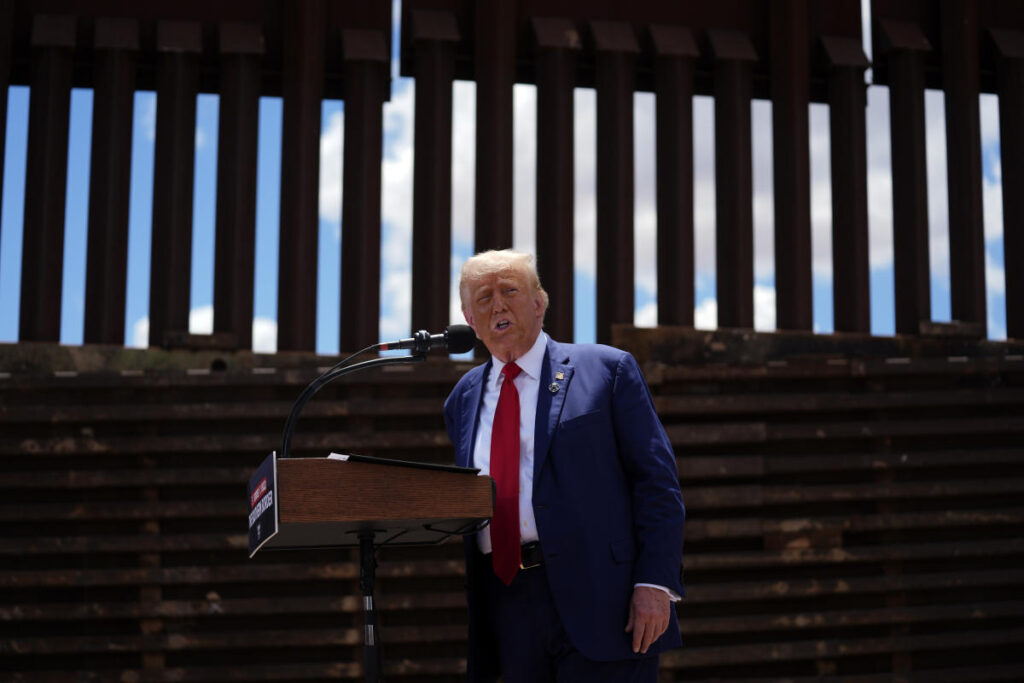Donald Trump has boldly proclaimed that if returned to the presidency, he would make inflation “vanish completely,” a message that resonates with Americans facing the lingering effects of high consumer prices that have persisted for over three years. However, the consensus among mainstream economists is largely skeptical of Trump’s assertions, with many arguing that his proposed policies could actually exacerbate inflation rather than mitigate it. Notably, a letter signed by 16 Nobel Prize-winning economists warned that Trump’s economic agenda could “reignite” inflation, despite recent drops from its peak of 9.1% in 2022, with forecasts predicting a potential runaway inflation rate of between 6% and 9.3% by 2026 if Trump’s strategies were implemented.
While Trump’s tariffs on imports are a cornerstone of his economic policy aimed at protecting American jobs, economists argue these tariffs would significantly raise consumer prices. Trump has suggested imposing a sweeping 60% tariff on Chinese goods and a universal tariff of 10% to 20% on all other imports. Critics point out that such tariffs are ultimately paid by U.S. importers, who typically pass the increased costs onto American consumers. According to calculations by the Peterson Institute, the proposed tariffs could lead to an annual after-tax burden of $2,600 per typical American household, a stark contrast to the relatively low inflation experienced during Trump’s first term when tariffs were less impactful.
Another key aspect of Trump’s policy proposals centers around immigration. He has vowed to undertake the largest deportation campaign in U.S. history, which economists warn could reverse recent gains made in easing inflation. The influx of foreign-born workers has helped mitigate inflationary pressures by filling job vacancies and preventing wages from soaring too high. Recent analyses indicate that the increased net immigration to the U.S. has allowed industries to expand without excessively raising prices, suggesting that mass deportations could introduce new inflationary pressures. The Peterson Institute estimates that if Trump were successful in deporting millions of undocumented immigrants, inflation could rise by as much as 3.5 percentage points by 2026.
In addition to tariffs and immigration policies, Trump also raised concerns with his remarks about seeking a direct influence over the Federal Reserve’s interest rate strategies. The Fed plays a crucial role in managing inflation through interest rate adjustments, but economists assert that its effectiveness hinges on maintaining political independence. Trump’s previous pressures on Fed Chair Jerome Powell to lower rates during his presidency garnered criticism and were likened to historical attempts by leaders like Johnson and Nixon, which contributed to inflationary crises in the past. The Peterson Institute’s analysis suggests that undermining the Fed’s autonomy could result in an inflation increase of approximately 2 percentage points annually, further complicating efforts to stabilize the economy.
Meanwhile, the current administration’s economic strategies under Vice President Kamala Harris have also faced scrutiny. While many economists dismiss her proposals as ineffective, they generally do not classify them as inflationary. Moody’s Analytics forecasts predict that even if Harris had a Democratic majority, her policies would maintain the inflation outlook without significant alteration. In contrast, Trump’s unchecked economic agenda is expected to leave inflation at notably higher levels, with projected increases in consumer prices over the next few years.
In summary, Trump’s promise to eliminate inflation draws skepticism when scrutinized against the backdrop of economic analysis. While he positions himself as a champion of the working class by promoting tariffs and strict immigration policies, economists warn that the consequences could lead to a heightened inflationary environment that burdens American consumers. The dire consequences of entangling the Federal Reserve with political pressures underscore the complexities of managing a robust economy. Ultimately, the divergence between the fiscal policies of Trump and those of the incumbent administration paints a complex picture for voters as they consider the ramifications of economic leadership on inflation rates and household finances in the years to come.

